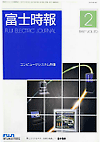FUJI ELECTRIC JOURNAL Vol.70-No.2 (Feb/1997)
 |
Computer Systems |
Present Status and Prospects for Computer Systems
Narumi Ibe, Masakiyo Ooshiba
In the society agitated by various domestic and foreign causes, enterprises are all compelled to take measures for survival. As a result, the computer systems, the pivot of industrial activities, are also forced to undergo a big change to meet the requirements and developed toward open, distributed, downsized, and integrated systems. Under these circumstances, this paper reviews the general trends and problems of computer systems mainly in the industrial field and outlines Fuji Electric's attitude to these problems.
Fuji Electric's Computer Systems
Katsuhiro Tsuchida, Shigeru Ohmori, Hidejirou Asano
Information processing is getting in the day of "network computing." The business environment around the industrial field is rapidly changing and just showing new development. This environmental change has an influence on information control systems in the industrial field, resulting in a rising tendency toward open platform application. This paper outlines the present state of Fuji Electric's computer systems, such as measures for open, distributed computing to meet the requirements of the times and products prepared for the systems.
Middle Software for Developing Computer Systems
Yoshio Hayashi, Ken'ichi Ishikawa
Because of progress in computer and communication network technologies and software standardization, supervisory control systems are shifting to open, distributed systems. In structuring an open, distributed system, the software engineer is required to have high-level technique. Therefore, attention is given to distributed middle software that enables the efficient development of open, distributed systems. This paper introduces the aim and functions of distributed, middle software which has borne fruit since several years ago.
Human Interfaces for Computer Systems
Fukashi Koyama, Yoshihiro Ikawa, Shunichi Hirabayashi
With the wide use of workstations and personal computers, human interfaces have rapidly developed. In the industrial field, interfaces using multiple windows, three-dimensional vision, a large screen, and multimedia capable of real-time processing of captured motion video and sounds are on the rise. Taking over the industrial graphic functions accumulated before, Fuji Electric has developed "picture composition software" using object-oriented technology. This paper introduces its outline, functions, and features.
Operation Control Environment for Computer Systems
Tadahiko Inagami, Satoshi Sakoda
In a distributed supervisory control system, two or more computers in cooperation execute work, so the maintenance of system reliability is very important. To attain this, an environment which minimizes an influence due to a computer failure in the distributed system upon the whole system is necessary. This paper introduces the software packages, modePro and SysPro-Guard, which provide necessary functions for the above operation control.
Software Production Technology
Shigeharu Kawai
This paper describes the software reuse and quality assurance of software production technology. About the software reuse, introduced are the system development procedure with the AP control method, which is the standard method for developing supervisory control systems, and the application of object-oriented technology, which is new software production technology. About the software quality assurance, introduced are the contents of MSP promotion activities Fuji Electric is tackling systematically and the control system of data on quality.
Network Systems for Industrial Computer Systems
Junichi Fujii
Because of the progress of network technology represented by the Internet, an enterprise rapidly prepares a network system as the infrastructure, and its systems ranging from management information systems to monitoring and control ones are on the way to an integrated system through this network. This paper reviews the latest trend of networks from the point of view of monitoring and management systems and introduces some of Fuji Electric's products for networks.
Computer Systems for Electric Power Systems
Yoshihiro Niinaga, Tsuyoshi Matsumoto, Shigeichi Sagae
CComputer systems for electric power systems are developing from the former systems which laid stress on monitoring and control into high-value-added systems which aim at the whole business re-engineering. Besides, the trend of the whole information processing systems is toward open, distributed systems backed by progress in the high-speed processing, LAN (local area network), and general-purpose software technologies of work-stations and personal computers. This paper introduces recent trends and technological developments of computer systems for electric power systems.
Computer Systems for Water and Sewage Works
Yuuichi Sasaki, Kaoru Yamagishi, Tadayuki Takahashi
Environmental changes and technical progress are changing computer systems for water and sewage works. This paper introduces Fuji Electric's computer network system for water and sewage works composed of five subsystems: (1) operating and control systems (2) multimedia and communication systems (3) support and service systems (4) emergency and disaster-preventive systems (5) monitoring and control systems. This system is characterized by information for common use in a broad sense.
Industrial Computer Systems
Yutaka Watanabe, Mitsuhiro Watanabe
There are growing severe user needs for advanced functions and system extensions in addition to low cost. As a solution to meet these needs, Fuji Electric tackles the development of systems with advanced business functions installed on the open platform. This paper introduces recently commercialized technologies, such as intelligent alarms for supervisory control, multimedia-aided equipment maintenance systems, scheduling systems taking utility cost into consideration, and business rationalization systems for manufacturers.
Basic Business Package and Group Software
Motoki Ito, Youji Kikuchi, Ryoichi Tokunaga
To survive the age of "global competition", enterprises require reunifying basic business systems and introducing a new system which can hold information on active workshops in common. With regard the former, this paper suggests that a system with the nucleus of unified basic business package be structured, and know-how for manufacturing systems, appropriate consulting, and cooperation with package vendors be the points. With regard to the latter, it proposes the introduction and practical use of "Exchange USE".
Substation Equipment for Jandar Combined Thermal Power Station, Syria
Takeo Nihei, Ikuo Ando, Tadashi Shimizu
Fuji Electric received the order for the 400/230/66/20-kV substation of Jandar 700-MW Combined Thermal Power Station through Mitsubishi Heavy Industries, Ltd. The substation was handed over in 1995, and continues to give satisfactory results. This paper introduces an outline of the substation equipment.

